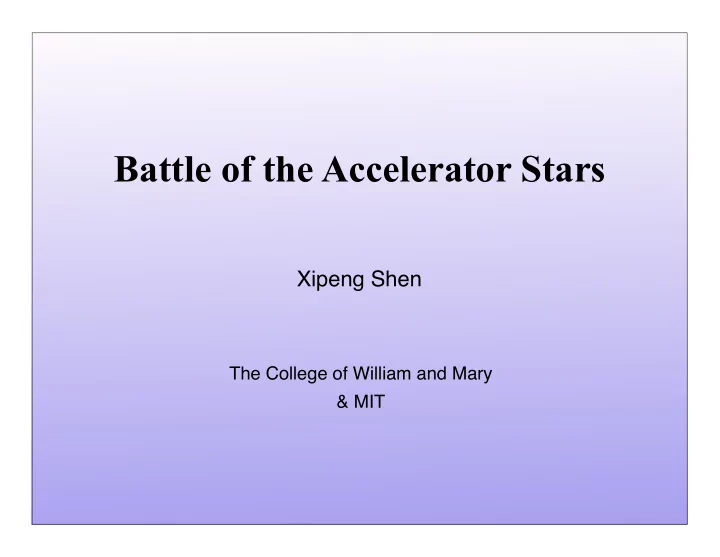

Battle of the Accelerator Stars Xipeng Shen The College of William and Mary & MIT
Top500 6/2012 source: top500.org 2 Xipeng Shen xshen@cs.wm.edu
Green500 (6/2012) What is the role of accelerator? source: green500.org 3 Xipeng Shen xshen@cs.wm.edu
Q1: Role of Accelerator It is a trend. A common perception in processor industry. • Intel: Ive Bridge, MIC • AMD: Fusion (APU) • NVIDIA: Kepler, Tegra, Denver Project • IBM: (CELL), (Kilocores), specialized proc. on FPGA • TI: OMAP • ... ... 4 Xipeng Shen xshen@cs.wm.edu
Q1: Role of Accelerator • Adoption in practice • Embedded systems: long history. • Desktop, workstations, servers: GPU, FPGA. • HPC: • Titan (ORNL):19KCPU+14KGPU, 20PF • Blue Waters: 49K CPU+3KGPU, 11.5PF • Reasons • Moor’s law continues • More transistors meet power wall and memory wall • Power efficiency • Specialization gives efficiency: An old receipt. 5 Xipeng Shen xshen@cs.wm.edu
Q1: Role of Accelerator • Adoption in practice • Embedded systems: long history. • Desktop, workstations, servers: GPU, FPGA. • HPC: • Titan (ORNL):19KCPU+14KGPU, 20PF • Blue Waters: 49K CPU+3KGPU, 11.5PF • Reasons • Moor’s law continues • More transistors meet power wall and memory wall • Power efficiency • Specialization gives efficiency: An old receipt. 5 Xipeng Shen xshen@cs.wm.edu source: linuxfordevices.com
Q1: Role of Accelerator • Adoption in practice • Embedded systems: long history. • Desktop, workstations, servers: GPU, FPGA. • HPC: • Titan (ORNL):19KCPU+14KGPU, 20PF • Blue Waters: 49K CPU+3KGPU, 11.5PF • Reasons • Moor’s law continues • More transistors meet power wall and memory wall • Power efficiency • Specialization gives efficiency: An old receipt. 6 Xipeng Shen xshen@cs.wm.edu
Q1: Role of Accelerator • Adoption in practice • Embedded systems: long history. • Desktop, workstations, servers: GPU, FPGA. • HPC: • Titan (ORNL):19KCPU+14KGPU, 20PF • Blue Waters: 49K CPU+3KGPU, 11.5PF • Reasons • Moor’s law continues • More transistors meet power wall and memory wall • Power efficiency • Specialization gives efficiency: An old receipt. 6 Xipeng Shen xshen@cs.wm.edu
Q2: SW/HW Divergence Hardware excitement meets the cold reality of parallel programming. • HW • non-uniformity, massive parallelism, variety • Complexities are shifting to SW • SW trails HW more than ever • Multiple dimensions • Productivity, Efficiency, Performance, Portability, Fault tolerance 7 Xipeng Shen xshen@cs.wm.edu
Q2: SW/HW Divergence • Dynamically changing spectrum of SW support • DSL • CUDA • OpenCL • C++AMP • Cilk plus • Directives (e.g., OpenACC) • Various tools for assistance • ... 8 Xipeng Shen xshen@cs.wm.edu
Q3: Which HW will win? • NVIDIA GPU currently dominate • Integrated CPU+GPU is promising • Others (e.g., FPGA, DSP) will co-exist • Depends on SW support • Not just accelerators, but whole processors • e.g., ARM for HPC? 9 Xipeng Shen xshen@cs.wm.edu
Q4: Which SW will win? • Current situation (for HPC) • CUDA has been adopted a lot • Pros: High performance, minor extensions from C • Cons: not portable yet, some programming efforts • OpenCL and directives have the potential • Pros: Portable; directives are easier to use • Cons: Performance • DSL draws increasing interest. 10 Xipeng Shen xshen@cs.wm.edu
Q4: Which SW will win? • In the decade • For HPC: • Key question: can the performance of OpenCL and directives catch up? • Some good signs, but also hard lessons (e.g., single- source compiler for cell) • For others: • OpenCL and directives are more likely • An analogy • C/C++ & Java 11 Xipeng Shen xshen@cs.wm.edu
Q5: Challenges • Key challenge: programming support. • productivity • performance & efficiency (locality, communication, balance) • fault tolerance • portability (exec. & performance) • Irregular computations 12 Xipeng Shen xshen@cs.wm.edu
Recommend
More recommend